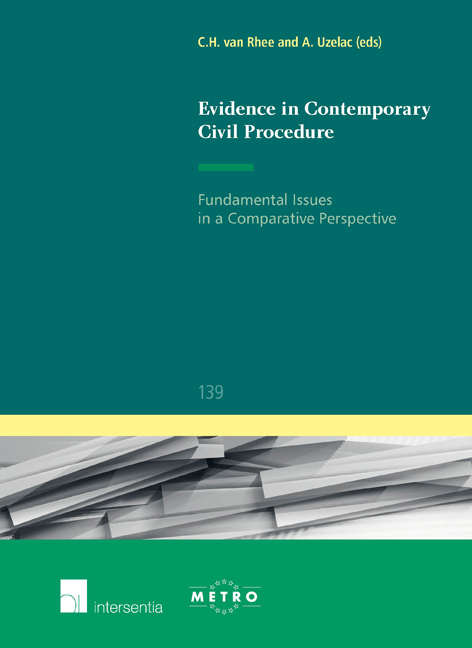Book contents
- Frontmatter
- Contents
- List of Authors
- Acknowledgements
- INTRODUCTION
- EVIDENCE IN CIVIL PROCEDURE: THE FUNDAMENTALS IN LIGHT OF THE 21ST CENTURY
- FUNDAMENTAL AND OTHER PRINCIPLES OF EVIDENCE IN CIVIL LITIGATION
- TYPES OF EVIDENCE IN CIVIL LITIGATION
- EVIDENCE IN ARBITRATION AND NATIONAL CIVIL LITIGATION
- REGISTRAR
- EVIDENCE IN CROSS BORDER CIVIL LITIGATION
- IUS COMMUNE EUROPAEUM
EVIDENCE IN CIVIL PROCEDURE: THE FUNDAMENTALS IN LIGHT OF THE 21ST CENTURY
from INTRODUCTION
Published online by Cambridge University Press: 15 December 2017
- Frontmatter
- Contents
- List of Authors
- Acknowledgements
- INTRODUCTION
- EVIDENCE IN CIVIL PROCEDURE: THE FUNDAMENTALS IN LIGHT OF THE 21ST CENTURY
- FUNDAMENTAL AND OTHER PRINCIPLES OF EVIDENCE IN CIVIL LITIGATION
- TYPES OF EVIDENCE IN CIVIL LITIGATION
- EVIDENCE IN ARBITRATION AND NATIONAL CIVIL LITIGATION
- REGISTRAR
- EVIDENCE IN CROSS BORDER CIVIL LITIGATION
- IUS COMMUNE EUROPAEUM
Summary
Introduction
If civil procedure lies at the heart of every legal system, the taking of evidence lies at the heart of every civil procedure. Yet, there are very few comparative works that attempt to present the topical issues of evidentiary proceedings in civil litigation. The harmonization of procedural law in the European Union has not changed this situation, irrespective of the fact that mutual cooperation of European judicial systems as regards the taking of evidence in civil and commercial matters forms part of the European acquis. Nevertheless, comparative research of the trends and developments in the national practices of evidence-taking in civil litigation has a lot to offer. Since the start of the new millennium, many contemporary jurisdictions are revisiting the fundamental principles of their civil procedures. The core areas of the civil process are not left untouched, including the way in which evidence is being introduced, collected and presented in court. One generator of the reforms in the field of evidence-taking in the past decades has been the challenge of slow and inefficient litigation. While the taking of evidence is not the only reason for the endemic deficiencies that have put into jeopardy the human right to a trial within reasonable time, in many national justice systems it has been contributing a fair share to it. Difficult access to information, inaccessibility of witnesses, and time consuming processes of producing expert testimony have been the cause of frustration for many court-goers across the European continent and elsewhere. Both in Europe and globally, reaching a balance between the demands of factual accuracy and the need to adjudicate disputes in a swift, cost-effective and efficient way is still one of the key challenges. The rise in court backlogs, the difficulties of many national civil justice systems in securing a reasonable length of the central stages of their civil proceedings as well as an increased influx of new cases and reduced budgets of national judiciaries contribute to the reform trends aimed to streamline, simplify and accelerate fact-finding procedures.
The second reason why many countries are reforming their law of evidence is related to cultural and technological changes in modern societies.
- Type
- Chapter
- Information
- Evidence in Contemporary Civil ProcedureFundamental Issues in a Comparative Perspective, pp. 3 - 14Publisher: IntersentiaPrint publication year: 2015
- 1
- Cited by



